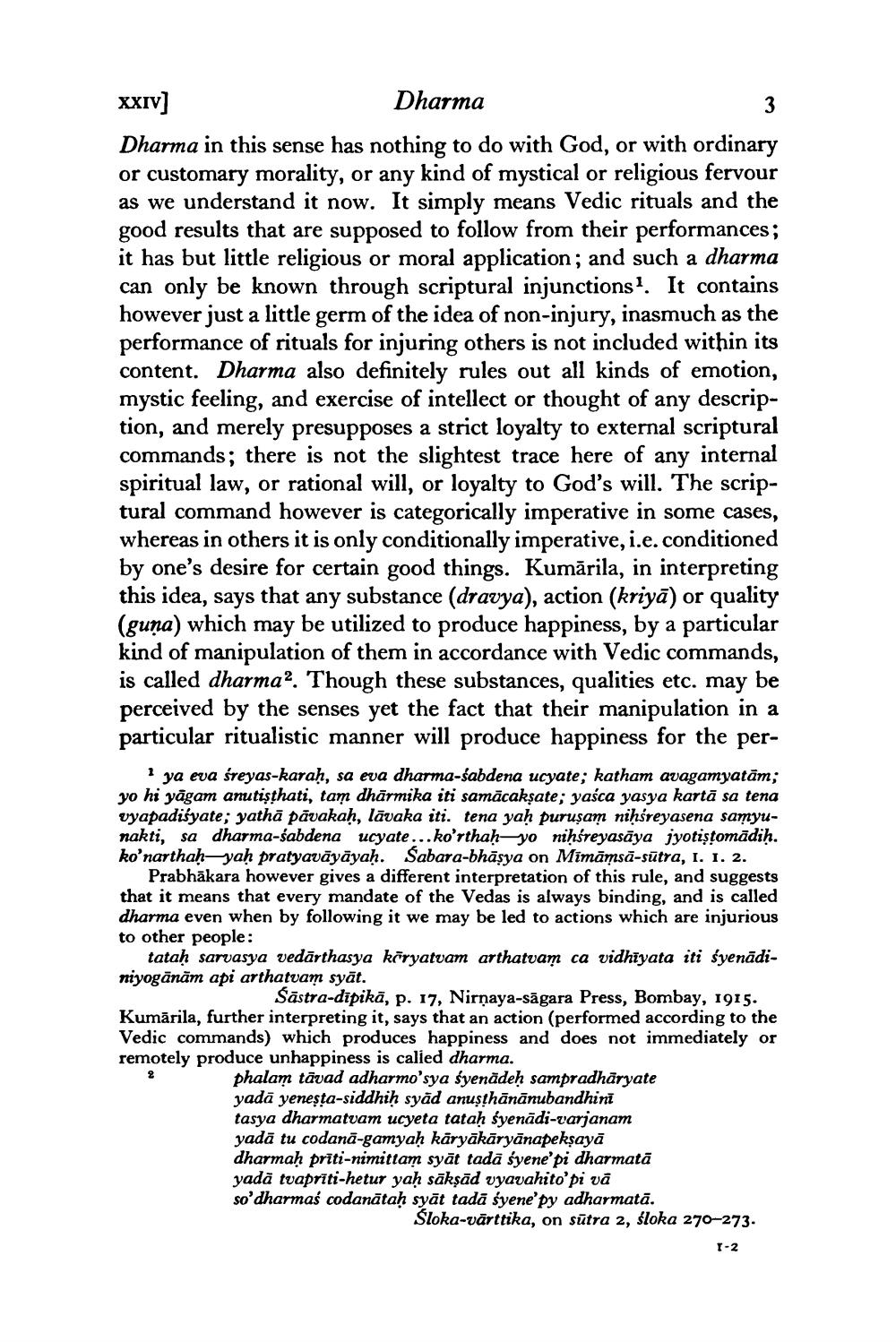________________
XXIV]
Dharma Dharma in this sense has nothing to do with God, or with ordinary or customary morality, or any kind of mystical or religious fervour as we understand it now. It simply means Vedic rituals and the good results that are supposed to follow from their performances; it has but little religious or moral application; and such a dharma can only be known through scriptural injunctions. It contains however just a little germ of the idea of non-injury, inasmuch as the performance of rituals for injuring others is not included within its content. Dharma also definitely rules out all kinds of emotion, mystic feeling, and exercise of intellect or thought of any description, and merely presupposes a strict loyalty to external scriptural commands; there is not the slightest trace here of any internal spiritual law, or rational will, or loyalty to God's will. The scriptural command however is categorically imperative in some cases, whereas in others it is only conditionally imperative, i.e. conditioned by one's desire for certain good things. Kumārila, in interpreting this idea, says that any substance (dravya), action (kriyā) or quality (guna) which may be utilized to produce happiness, by a particular kind of manipulation of them in accordance with Vedic commands, is called dharma2. Though these substances, qualities etc. may be perceived by the senses yet the fact that their manipulation in a particular ritualistic manner will produce happiness for the per
ya eva śreyas-karaḥ, sa eva dharma-śabdena ucyate; katham avagamyatām; yo hi yāgam anutişthati, tam dhārmika iti samācakşate; yaśca yasya kartā sa tena vyapadiśyate; yathā pāvakaḥ, lāvaka iti. tena yah puruşam niḥśreyasena samyunakti, sa dharma-sabdena ucyate ... ko'rthaḥ-yo niņśreyasāya jyotiştomādih. ko'narthah-yah pratyavāyāyaḥ. Sabara-bhāsya on Mimāmsā-sūtra, I. I. 2.
Prabhākara however gives a different interpretation of this rule, and suggests that it means that every mandate of the Vedas is always binding, and is called dharma even when by following it we may be led to actions which are injurious to other people:
tataḥ sarvasya vedārthasya kõryatvam arthatvam ca vidhiyata iti śyenādiniyogānām api arthatvam syāt.
Sāstra-dīpikā, p. 17, Nirnaya-sāgara Press, Bombay, 1915. Kumārila, further interpreting it, says that an action (performed according to the Vedic commands) which produces happiness and does not immediately or remotely produce unhappiness is called dharma.
phalam tāvad adharmo'sya śyenāde” sampradhāryate yadā yeneşta-siddhih syâd anusthānānubandhini tasya dharmatvam ucyeta tataḥ śyenādi-varjanam yadā tu codanā-gamyaḥ käryäkāryānapekṣayā dharmaḥ priti-nimittam syāt tadā śyene' pi dharmatā yadā tvapriti-hetur yaḥ sākşād vyavahito'pi va so'dharmaś codanātaḥ syāt tadā śyene'py adharmatā. Śloka-vārttika, on sūtra 2, śloka 270-273.
1-2




